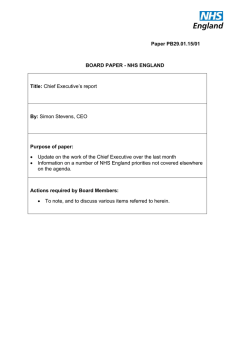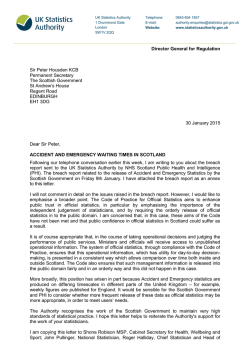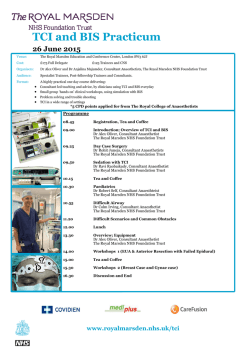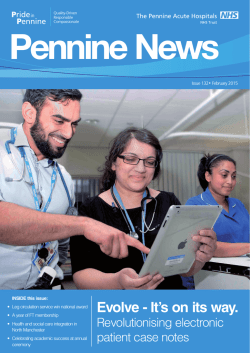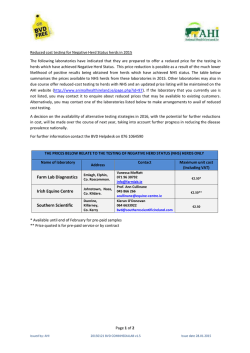
DH Corporate Plan 2014-2015
DH Corporate Plan 20142015 June 2014 Title: DH Corporate Plan 2014-2015 Author: Group Operations/ Governance Unit/ Business Assurance / 17152 Document Purpose: Corporate Report Publication date: June 2014 Target audience: DH Senior Civil Servants, DH Business Leads and anyone with an interest in DH Corporate Plans. Contact details: Governance Unit Room 220 Richmond House 79 Whitehall London SW1A 2NS You may re-use the text of this document (not including logos) free of charge in any format or medium, under the terms of the Open Government Licence. To view this licence, visit www.nationalarchives.gov.uk/doc/open-government-licence/ © Crown copyright Published to gov.uk, in PDF format only. www.gov.uk/dh 2 DH Corporate Plan 20142015 Prepared by: Governance Unit; Department of Health 3 Contents Introduction About the Department of Health: The Department in 2014-2015 Summary 8 Chapter 1: Department of Health’s goals and priorities 9 Chapter 2: The Corporate Plan 2014 – 2015 5 10 Chapter 3: Achieving the Department’s Goals and Priorities: - Living and ageing well: • preventing people from dying prematurely • transforming care outside hospital • implementing social care reform • improving treatment and care of people with dementia - Caring better: • improving the standard of care • making a step change in the way technology and information is used • ‘parity of esteem’ between mental and physical health - Preparing for the future: • productivity, sustainability and value for money • contributing to economic growth • developing the organisational capability and resilience of the Department to fulfil its stewardship role Chapter 4: Department of Health’s Arm’s Length Bodies Chapter 5: Health and Care System Facts Chapter 6: Sustainable Development and Climate Change Chapter 7: Equality & Human Right Objectives Chapter 8: 2013 - 14 Achievements Department of Health Ministers Department of Health Non-executive Board Members Department of Health Leadership Team 4 11 13 14 15 16 18 19 20 21 22 23 26 28 29 30 32 33 34 DH Corporate Plan 2014-2015 Introduction Last year was one of achievement for the Department of Health and the wider health and care system. Among the significant successes were: • the transition to the new health and care system which was delivered successfully and safely, on time, within budget and with a minimum of disruption; • the Department’s internal change programme, ‘Our DH’, which started the Department’s transformation into a more resilient and agile organisation; • the Department’s and wider health and care system’s response to the inquiries into serious failings in care following the publication of reports into Winterbourne View and the Mid Staffordshire NHS Foundation Trust. Both rightly called for changes: greater transparency; more explicit professional and organisational accountability; and a renewed culture of compassionate care. At the heart of everything that the Department does is the drive for high quality and safe care for patients, service users and the public; by the end of April 2014 staff had spent over 1,700 days “connecting” with organisations across the health and care system; and • delivery of the Department’s key priorities set out in the 2013 - 14 Corporate Plan. In the year ahead, 2014 - 2015 will see the Department build on these achievements to deliver, with its partner organisations, an ambitious and challenging set of government and departmental priorities. The overwhelming priority this year is to maintain a relentless focus on the delivery of policy commitments and performance across the system as a whole. One year on from the Francis Report, the Department must strive for continuous improvement in the quality and safety of care. Government priorities must still be delivered and, at the same time, an ever tightening financial situation must be well managed. The Department will be preparing for both a Spending Review and a General Election in the summer 2015. Each will bring a renewed policy agenda for the Department. Specific areas of focus during 2014 - 2015 will be: • delivering the Government and Department’s priorities for health and care; 5 DH Corporate Plan 2014-2015 • ensuring performance on quality, access and finance is maintained throughout the winter of 2014 - 2015; • implementing the social care reforms set out in the Care Act 2014; • publishing a plan to transform primary care, including: - updating the legislative framework to enable GP contract changes, including plans for a named GP for over 75s; providing stewardship and support to organisations leading on work to develop better models of out of hospital care; • enabling the behavioural and cultural change across the system recommended by the Francis Report; • maximising international competitiveness and economic growth through health research and the National Institute for Health Research by ensuring the best possible environment within the NHS for undertaking life sciences research; • building the base of research evidence that patients, their carers, the public, professionals and policy makers need to make the best decisions about health and social care; • contributing to the economic growth of the UK. To support this important area of work the Department has appointed a Director General for Innovation, Growth and Technology; • preparing for the next Spending Review in 2015 and a future Government administration; and • developing an increasingly mature view of the Department’s role of stewardship in practice, ensuring that the new system is working effectively, both nationally and in localities, and that senior managers across the system lead change and demonstrate new ways of working. This ambitious set of priorities will contribute to the on-going transformation of the health and care system that is required to drive continuous improvement in the quality and safety of care to meet patients and the public’s expectations. As system steward, the Department has a unique responsibility to provide a leadership role in ensuring that the system as a whole responds collectively to these challenges. During 2014 - 2015, the Department is also committed to becoming more agile and adaptable in the way it works – with improved capability and capacity where it is needed; more project-based working; a more modern workplace; more digital ways of working; more shared services; more open policy making; stronger connections to the front line and a focus on demonstrating the right values and behaviours. The Department will actively continue to pursue the Civil Service Reform (CSR) agenda, contributing to the creation of a Civil Service that is fit for the 21st century. 6 DH Corporate Plan 2014-2015 This means focussing improvement on the key CSR initiatives which will make a significant difference to the way the Department works. The recently published Departmental Improvement Plan sets out in detail the priority areas for improvement that the Department will address over the next two years so that it can become a better health department and a better department of state, and build the skills, capabilities and resilience of staff. The Department’s Structural Reform Plan sets out a series of actions the department will take in support of the Coalition Government’s priorities. There are clear “start” and “end” dates attached to each action. The Number 10 transparency website reports the progress against these actions. It is high level in nature and the language is tailored to be consistent with SRPs across government departments. Therefore, this Corporate Plan provides an overview of the Department’s programme of work to deliver the Government’s priorities and is underpinned by more detailed business plans for each of its arm’s length bodies and departmental directorates. It is aligned with the Department’s Structural Reform Plan to capture priorities of both the Department and Government. Taken together, these plans provide a blueprint for the Department – setting out the longer term aims (the Structural Reform Plan), the Department’s business goals for this year and the key milestones along the way that will help to deliver them (this Corporate Plan) and the on-going transformation that the Department needs to achieve to support its role as leader of the health and care system and the improvement in capability required to deliver its priorities over the next few years (the Departmental Improvement Plan). 7 DH Corporate Plan 2014-2015 The Department in 2014 - 2015 - Summary We lead the health and care system to ensure people experience a service that protects and promotes health and provides safe, effective and compassionate care We work at the Department of Health to help people stay in good health and live independent lives We have three goals for the future We will improve our work to achieve these goals Living and ageing well – Leading confidently – helping people live healthier lives, making this country the best place in the world in which to grow old being an effective steward of the health and care system by providing strategic direction, building partnerships and being accountable and connected to patients and the public In 2014, our priorities are preventing disease and poor health, improving care for people over 75, reforming social care, integrating health and care, and improving care for people with dementia Building capability – improving leadership and change management, programme and project management, and increasing digital skills Caring better – Improving policy making – raising standards in health and care, ensuring everyone is treated with compassion and respect ensuring we have the knowledge and strategic capability to address our major policy challenges Increasing openness – In 2014, our priorities are improving the quality of care and the use of technology, encouraging greater openness and taking significant steps towards parity of esteem between mental and physical health having clearer priorities, reducing bureaucracy and providing the public with more accessible information on the performance of services Preparing for the future – making the right decisions today so that the health and care system can meet the needs of people in the future In 2014, our priorities are ensuring the long-term sustainability of the system by maintaining quality, access and financial performance, working more efficiently and investing in research and innovation 8 DH Corporate Plan 2014-2015 Chapter 1: Department of Health’s Goals and Priorities Below are set out the Department’s three overarching goals and the priorities that the Department will focus on this year to move towards these goals Goal one - Living and ageing well: preventing people from dying prematurely by improving mortality rates for the big killer diseases, to be the best in Europe through improving prevention, diagnosis and treatment and reducing health inequalities; transforming care outside hospital, focusing on the role of primary care in providing integrated out of hospital care, but also looking at what can be done to improve urgent and emergency care; implementing social care reforms including integrating health and social care, set out in the Care Act 2014; and improving treatment and care of people with dementia to be among the best in Europe through early diagnosis, better research and better support. Goal Two - Caring better: improving the standard of care throughout the system so that quality of care is considered as important as quality of treatment for everyone, through more accountability, better training, expert inspections, improving safety and more attention paid to what patients say and reducing inequalities in outcomes from care; making a step change in the way technology and information is used to enable more efficient and joined up working across the NHS and wider health and care system, improving quality of care and help people manage their own healthcare; and demonstrating real and meaningful progress towards achieving true ‘parity of esteem’ between mental and physical health by March 2015. Goal Three - Preparing for the future: improving productivity and long term sustainability and ensuring value for money for the taxpayer; contributing to economic growth; and developing organisational capability and the resilience of the Department to fulfil its stewardship role for the health and care system. 9 DH Corporate Plan 2014-2015 Chapter 2: The Corporate Plan 2014 – 2015 Everything the Department does is centred on delivering its goals, and it can only do that by working closely with partner organisations across the health and care system. During 2013 - 2014, the Department developed strong relationships with partners across the health and care system, some of which were with entirely new organisations. During 2014 - 2015, the Department will continue to strengthen these relationships to meet any challenges together. Most of the expertise in health and social care, and virtually all of the mechanisms for its delivery, lie outside the Department in the wider system. That is why the Department must increasingly work through strategic alliances with external organisations at national and local levels to deliver its short, medium and longer term goals. The needs of patients, service users and the public are at the centre of everything the Department does. The Department has a responsibility, as system steward, to ensure that it leads by example, in listening to what others say about the quality of care delivered and the sort of services they want, and ensuring that the rights of patients and service users are upheld. During the year the Department’s “Connecting” programme will be rolled out further to ensure that all groups of staff can experience at first hand the realities of frontline health and care delivery. The Department aims to be an excellent organisation to work with and an organisation that staff are proud to work in. This Corporate Plan sets out the business actions which the Department will need to achieve during 2014 - 2015 to deliver the ten government and departmental priorities, grouped within the three departmental goals for the future: living and ageing well; caring better; and preparing for the future. This plan is underpinned by detailed directorate plans and individual business plans from its arm’s length bodies. Together, the combination of the plans provide the basis for delivery during a challenging year. 10 DH Corporate Plan 2014-2015 Chapter 3: Achieving the Department’s Goals and Priorities Goal One: Living and Ageing Well LIVING AND AGEING WELL – helping people live healthier lives, making this country the best place in the world in which to grow old. In 2014 - 2015, the Department’s priorities are preventing disease and poor health, improving care for people over 75, reforming social care, integrating health and care, and improving care for people with dementia. Priority 1: Preventing people from dying prematurely by improving mortality rates for the big killer diseases, to be the best in Europe through improving prevention, diagnosis and treatment and reducing health inequalities. To achieve this, in 2014 - 2015 the Department will: • • • • • • Publish the third year reports from the partners of the Responsibility Deal which aims, by working with industry, to deliver voluntary action to tackle lifestyle risk factors that lead to disease. Roll out childhood flu immunisation for 2 to 4 year olds, and roll out pilots in primary and secondary schools. Launch a consultation to inform a final decision by ministers on whether to introduce standardised packaging for tobacco following publication of the independent review led by Sir Cyril Chantler Consult on new sensible drinking guidelines, taking on board expert advice. Introduce regulations to take effect from April 2015 to ban the sale of ecigarettes to children, the proxy purchasing of cigarettes for children, and smoking in cars with children. Maintain the UK’s preparedness for influenza pandemic and test crossGovernment resilience via a Tier 1 exercise which involves the Government’s emergency committee (COBR) and Ministers. 11 Quarter 1 Quarter 2 Quarter 3 DH Corporate Plan 2014-2015 • • • • • Deliver the Prime Minister’s commitment to achieving 60% bowel scope screening coverage by the end of 2014 - 2015. In partnership with NHS England and Public Health England, deliver early diagnosis campaigns, for example ‘Be Clear on Cancer’. Increase the number of places on the Family Nurse Partnership programme to 16,000 to improve outcomes for young, at risk, first time mothers and their babies. Publish quarterly status checks on progress towards the commitment to increase the number of health visitors by 4,200 extra full time equivalents and to implement an enhanced service offer for all families in England in line with the Health Visitor Implementation Plan: A Call to Action – 2011-15. Publish second year Reducing Avoidable Mortality Programme (RAMP) action plan. 12 Quarter 4 DH Corporate Plan 2014-2015 Priority 2: Transforming care outside hospital, focusing on the role of primary care in providing integrated out of hospital care, and also look at what can be done to improve urgent and emergency care. To achieve this, in 2014 - 2015 the Department will: • Publish, with NHS England, a future vision for transforming primary care. • Establish a National NIHR Director for Dementia Research • Together with NHS England, ensure that all people aged 75 and over have a named accountable GP. Together with NHS England, ensure that 800,000 people are enrolled the on Proactive Care Programme, and have a proactive care and support plan. Use data and feedback available to evaluate the next steps for the policy set out in Transforming Primary Care. Work with NHS England to evaluate and monitor implementation of the 2014 - 2015 GP contract. • • • 13 Quarter 1 Quarter 1 Quarter 2 Quarter 3 Quarter 4 DH Corporate Plan 2014-2015 Priority 3: Implementing social care reform, including integrating health and social care. To achieve this, in 2014 – 2015 the Department will: • • • • • • Publish draft regulations and statutory guidance to implement the Care Act in 2015 - 2016. Commence evaluation of 10 trial liaison and diversion schemes for vulnerable people at police stations and courts. Agree Better Care Fund plans, allocate funds locally and commence evaluations. Publish an evaluation report on Phase 1 of the 14 integration pioneer sites across England. Publish final 2015-2016 guidance and lay regulations for Care Act, and consult on draft 2016-2017 guidance and regulations. Establish legal and financial framework to implement Better Care Fund from April 2015. 14 Quarter 1 Quarter 2 Quarter 3 Quarter 4 DH Corporate Plan 2014-2015 Priority 4: Improving treatment and care of people with dementia to be among the best in Europe through early diagnosis, better research and better support. To achieve this, in 2014 – 2015 the Department will: • • • • • • • • • • • Work with Public Health England to launch a dementia movement to make the nation more aware of dementia and improve attitudes towards the condition, whilst also encouraging sign up to become a ‘dementia friend’. Publish the 2nd Annual Report of progress on the Prime Minister’s Challenge on Dementia. Host the first G8 Legacy Event on finance and social impact investment in dementia research in London. Establish the World Dementia Council and host the first meeting in April. Establish the Dementia “Entity” - a new organisation which, by working in partnership with researchers, clinicians, entrepreneurs, individuals, institutions and nations will help to accelerate treatment and improve care for dementia. Deliver annual update of the State of the Nation interactive maps on dementia. Work with Public Health England and the Alzheimer’s Society to ensure that by March 2015 one million people become dementia friends as part of the dementia movement. Work with NHS England to meet the ambition that by March 2015 two-thirds of people with dementia receive a diagnosis and appropriate post-diagnosis support. Work with the Alzheimer’s Society to ensure that 75 Dementia Friendly Communities are signed up to the foundation stage recognition process by March 2015. Publish a National Audit of Antipsychotic prescribing. Influence the United States to ensure a successful Final Legacy Event to review progress against the commitments and actions identified in the G8 Dementia Summit Declaration and Communique. 15 Quarter 1 Quarter 2 Quarter 3 Quarter 4 DH Corporate Plan 2014-2015 Goal Two: Caring Better CARING BETTER – raising standards in health and care, ensuring everyone is treated with compassion and respect. In 2014 - 2015, the Department’s priorities are improving the quality of care and the use of technology, encouraging greater openness and taking significant steps towards parity of esteem between mental and physical health. Priority 5: Improving the standard of care throughout the system so that quality of care is considered as important as quality of treatment, through more accountability, better training, expert inspections, improving safety and more attention paid to what patients say and reducing inequalities in outcomes from care. To achieve this, in 2014 - 2015 the Department will: • • • • • • • • • • • • Respond to the Public Accounts Committee Report on maternity services in England. Refresh the adult autism strategy action plan setting out the priorities for the next five years including setting up Autism Aware Communities, Autism Innovation Fund and better data collection. Advocate the ratification of a new resolution on Antimicrobial Resistance at the 67th World Health Assembly meeting which will provide the World Health Organisation with a mandate to work with Member States to develop a global action plan by 2015. The UK will play a leading role in contributing to this work. Work with NHS England and NHS Improving Quality to launch the Patient Safety Collaboration. Improve training for senior NHS staff and launch the Fast Track Executive Leaders Scheme to enable top NHS clinicians and new talent from outside the NHS to take up senior executive roles in the health service. Work with NHS England to develop guidance on the future roll out of the Friends and Family Test across the NHS services. Ensure access to Intensity Modulated Radiotherapy (IMRT) in the 24% of cancer cases that require radical radiotherapy, delivered by 50 radiotherapy centres nationwide. Launch a consultation on introducing medical examiners in a new system for death certification for England and Wales in response to the Shipman Inquiry’s Third Report and the Francis Inquiry Report on Mid Staffordshire. Ensure that acute hospitals provide information to the Department of Health on patients who have undergone Female Genital Mutilation, as a first step in building a more accurate nationwide picture of the challenge. Publish lessons learned from the Payment by Results drug treatment pilots. Consult on proposed changes to the 2015-16 Mandate to the NHS. Consult on proposed changes as part of refresh of the NHS Outcomes Framework 2015-2016. 16 Quarter 1 Quarter 2 DH Corporate Plan 2014-2015 • • • • • • • • • • • • • • • • • • Publish the updated NHS Mandate for 2015-2016. Publish the refreshed NHS Outcomes Framework 2015-2016. Publish the Adult Social Care Outcomes Framework for 2015-2016. Publish the ‘One Year On’ report on implementing the response to the Francis Report. Publish the first annual progress report on implementation of the UK Five Year Antimicrobial Resistance Strategy. Put in place secondary legislation to introduce a duty of candour on NHS organisations. Complete the roll out of Friends and Family Test to GP, community and mental health services. Launch the Patient Safety website which will include ward level information on staffing levels. Work with NHS England as they deliver their Mandate commitment to introduce the Friends and Family Test into general practice, community and mental health services by the end of December 2014. Publish Health Education England’s Mandate for 2015-2016. In response to the Winterbourne View Inquiry, ensure that people with learning disabilities who are inappropriately placed in hospital settings are moved into the community or have plans in place to be moved. Complete delivery of the Prime Minister’s £40m commitment to ensure leadership training and development for 10,000 nurses and midwives. Pilot, through NHS England, extended GP opening hours, weekend opening and better use of technology. Monitor the General Medical Council (GMC) implementation plan for 60% of doctors to be revalidated by the end of 2014 - 2015, confirming that licensed doctors’ skills are up to date and are fit to practise. Submit full business cases for two new proton beam therapy centres. Increase funding of the proton beam therapy programme to allow 400 patients to be treated overseas. Double the number of parents who benefit from receiving high quality advice and information from the Information Service for Parents on health advice and parenting. Launch the Care Certificate, a new approach to providing assurance that healthcare assistants and social care support workers have the required values, behaviours and skills to enable them to provide safe, compassionate care. 17 Quarter 3 Quarter 4 DH Corporate Plan 2014-2015 Priority 6: Technology revolution – making a step change in the way technology and information is used to enable more efficient and joined up working across the health and care system, improving quality or care and helping people manage their own healthcare. To achieve this, in 2014 - 2015 the Department will: • • • • • • • • • • • • • • Set direction for Secretary of State’s 2014 - 2015 technology deliverables. Establish National Information Board and sub-groups to develop a strategic decision-making and commissioning forum. Complete the audit of DH transactional services against the Government’s Digital by default service standard. Produce action plan to align all services to Government’s Digital by Default service standard. Complete migration of all relevant ALB websites to the single government domain ‘GOV.UK’. Publish comparable data on volumes, costs and digital take-up of online and offline health transactions. Publish the National Information Board Informatics Strategy. Introduce tests to ensure all online services for the public meet the Government’s minimum digital standards. Deliver up to 8,000 whole genome sequences as part of the Prime Minister’s long-term ‘100k genomes project’ to use this technology to enable the transformation of health outcomes for patients with rare diseases and cancer. Deliver on the Prime Minister’s commitment to offer £100m to the NHS for nurses and midwives to spend on new technology that will free up time for patient care. Ensure delivery of Secretary of State’s commitments on e-Referrals, eBooking and online booking of prescriptions. Ensure delivery of Secretary of State’s commitments on patient access to primary care records. Include data from a broader range of healthcare settings in the Clinical Practice Research Datalink (CPRD) in order to improve research on health outcomes. 18 Quarter 1 Quarter 2 Quarter 3 Quarter 4 DH Corporate Plan 2014-2015 Priority 7: Demonstrating real and meaningful progress towards achieving true parity of esteem between mental and physical health by March 2015. To achieve this, in 2014 - 2015 the Department will: • • • • • • Extend patients’ legal right to choice of any qualified provider for mental health services. Hold a mental health Crisis Care Concordat Summit which sets out how police, mental health, social work and ambulance professionals should work together to help people going through a mental health crisis. Agree access and/or waiting time standards for mental health services for inclusion in the 2015-2016 Mandate to the NHS. Publish a revised Mental Health Act 1983 Code of Practice and reference guide. Achieve Improving Access to Psychological Therapies (IAPT) rates of at least 15% of prevalence of people with anxiety and depression nationally, with at least a 50% recovery rate. Transform and improve Child and Adolescent Mental Health Services, extending access to evidence based psychological therapies for children and young people, increasing access to transformed CAMHS services to 60% of people aged under 19, through NHS England. 19 Quarter 1 Quarter 2 Quarter 3 Quarter 4 DH Corporate Plan 2014-2015 Goal Three: Preparing for the Future PREPARING FOR THE FUTURE – making the right decisions today so that the health and care system can meet the needs of people in the future. In 2014 - 2015, the Department’s priorities are ensuring the long-term sustainability of the system by maintaining quality, access and financial performance, working more efficiently and investing in research and innovation. Priority 8: Improving productivity, long-term sustainability and ensuring value for money for the taxpayer. To achieve this, in 2014 - 2015 the Department will: • • • • • • • • • • • Appoint Crown Representatives to lead on the NHS Key Supplier Management Programme, which has identified suppliers where spend across multiple trusts exceeds £35m per annum, with the aim of delivering a minimum of 10% savings from the strategic management of each NHS key supplier. Agree the in-year variation for 2015 to the Section 7A Agreement – which sets out those public health functions to be discharged on behalf of the Department by NHS England. Publish the NHS e-Procurement Strategy, Procurement Transparency Guidance and Toolkit to help combat inflation. Establish the NHS Centre for Procurement Efficiency and Academy for Procurement Excellence to help deliver £2bn of efficiency savings as well as developing long term leadership and capability in procurement across the NHS. Launch procurements for national e-procurement infrastructure and price benchmarking service. Publish an implementation plan for cost recovery for chargeable NHS patients. Finalise and publish the 2015-2016 agreement to the Section 7A which sets out those public health functions to be discharged on behalf of the Department by NHS England. Announce the preferred bidder and award the contract for re-procurement of the Electronic Staff Record system. Complete the initial transfer of activities relating to the procurement of common goods and services. Complete the sale of NHS Professionals Ltd (the leading provider of managed flexible worker service to the NHS), a wholly owned limited company, allowing private sector investment to take the company to develop further. Manage a ministerially led programme to provide rigorous monitoring, 20 Quarter 1 Quarter 2 Quarter 3 Quarter 4 DH Corporate Plan 2014-2015 challenge and assurance of progress by DH and the wider system in delivering savings for SR13 and the Secretary of State's sustainability plan. Priority 9: Contribute to economic growth. To achieve this, in 2014 - 2015 the Department will: • • • • • • • Appoint a Director General with responsibility for Innovation, Growth and Technology. Roll-out the Growth and Efficiency Fund to NHS Trusts. Submit to the SofS an NHS regenerative medicine delivery readiness strategy and action plan for ensuring that NHS patients can benefit from these innovative treatments and that the UK regenerative medicine industry is supported. Release sufficient land to allow the construction of 17,913 homes - a figure set in May 2013 by the Public Expenditure Efficiency and Reform SubCommittee (PEX (ER)). Publish a joint marketing plan and delivery of a single access point for the life sciences sector. Increase research collaboration with the medical device and diagnostics industry, including small and medium enterprises (SMEs), through the NIHR (National Institute for Health Research) clinical research infrastructure in the NHS. Launch the NIHR national Biosample Repository enhancing the nation’s capacity for research into disease mechanisms, diagnosis and treatments. 21 Quarter 1 Quarter 3 Quarter 4 DH Corporate Plan 2014-2015 Priority 10: Developing the resilience of DH – developing the organisational capability and resilience of the Department to fulfil its stewardship role of the health and care system. To achieve this, in 2014 - 2015 the Department will: • • • • • • • • Publish the Departmental Improvement Plan and develop plans for monitoring delivery of actions to improve capability and resilience. Set design principles of the new operating model that will enable the Department to be more agile and respond efficiently to ministerial priorities, taking into account lessons learned from other government departments. Use results from annual skills review and DH Pulse survey to assess improved capability of DH staff. Complete a review of capacity and capability of analysts and make recommendations to improve flexibility. Include new planning principles in the 2015-2016 Planning Guidance to improve the way the Department identifies and explains its priorities. Pilot elements of an Agile Working system and share lessons learned to inform a DH–wide approach, as part of the Our DH programme. Ensure all Senior Civil Servants (SCS) and all policy teams will spend time on “connecting” activity, with a view to accumulating 5,000 days of “connecting” experience by the end of June 2015. Implement the Health Research Authority assessment and approval process to make it easier and faster to undertake clinical research, including life sciences research, in the NHS. 22 Quarter 1 Quarter 2 Quarter 3 Quarter 4 DH Corporate Plan 2014-2015 Chapter 4: Department of Health’s Arm’s Length Bodies 23 DH Corporate Plan 2014-2015 Department of Health’s Arm’s Length Bodies Each of the Department’s partner organisations (ALBs) will have a part to play in meeting the Government’s priorities in 2014 - 2015. The term ‘arm’s length body’ is used to include two executive agencies (MHRA and PHE), seven executive non departmental public bodies and six NHS special health authorities. Preventing people from dying prematurely Transforming care outside hospital Implementing social care reform Improving dementia treatment and care Human Tissue Authority Human Fertilisation & Embryology Authority NHS Litigation Authority NHS Business Services Authority Medicines & Healthcare products Regulatory Authority NHS Blood & Transplant Health Research Authority Health Education England Health & Social Care Information Centre Public Health England National Institute for Health & Care Excellence Care Quality Commission NHS Trust Development Authority Monitor NHS England Each ALB has its own business plan, agreed with the Department, which sets out in detail how it will achieve its objectives. Delivery of the plan will provide assurance to the organisation itself, to the Department and to Parliament and the public that it is achieving its objectives. 24 DH Corporate Plan 2014-2015 Improving the standard of care Technology revolution ‘Parity of esteem’ between mental and physical health Productivity, sustainability and value for money Contributing to economic growth 25 DH Corporate Plan 2014-2015 Chapter 5: Health and Care in England System Facts NHS • • There were 7.732 million elective (planned) hospital admissions in 2013-14 1 There were 5.545 million non-elective (emergency) hospital admissions in 2013-14 • • There were 61.198 consultant-led outpatient attendances in 2013-14 1 There were 21.779 million attendances at Accident & Emergency departments in 2013-14 1 The NHS has a workforce of almost 1.2 million 2 It has over 110,000 doctors 2 It has over 350,000 nurses 2 There are over 40,000 GPs 2 • • • • Source: 1 1 2 NHS England Health & Social Care Information Centre Public Health • • • • • • England has one of the highest rates of obesity in the developed world - two thirds of adults are overweight or obese, a leading cause of type 2 diabetes and heart disease The gap between areas with the highest and lowest life expectancy is around 12 years Smoking still claims over 80,000 lives a year More than one in five adults in England, or nine million people, regularly drink alcohol at levels that could damage their health and more than 20,000 people die from alcohol-related causes each year Around 665,000 people in England have dementia The NHS Health Check programme is now being delivered in every local authority across England Source: Public Health England Social Care • • • • • Over 410,000 people live in residential care or nursing homes 1.1 million people received community based services from councils in 2012-13 There are 220,000 state supported users in residential care There are 720,000 state supported users of community services There are 1.63 million adult social care jobs in England 26 DH Corporate Plan 2014-2015 • • • There are estimated to be over 5.4 million informal carers In England, there are over 17,500 care and nursing homes Local councils fund 60% of adult social care Source: Social Care, Local Government & Care Partnerships Directorate 27 DH Corporate Plan 2014-2015 Chapter 6: Sustainable Development and Climate Change The Department of Health is committed to long-term sustainable development, ensuring that by delivering better care and well-being for the nation, it is also contributing to a strong, healthy and sustainable society for future generations. This fundamental principle underpins the Department’s health and social care vision, such that sustainability resonates with both staff and stakeholders. This is also in line with the Government’s vision to mainstream sustainable development right across departments, embedding it within governance, policy making, operations and procurement, so it becomes central to the way policy is made, buildings are run and goods and services are purchased To address these important issues, a Sustainable Development and Climate Change Steering Group was set up in and its purpose is to: • strengthen the governance of sustainable development activities across all parts of the department, with a specific focus on being ‘Climate Ready’ for the predicted effects from climate change and building on the good work already being done; • ensure that all policy making takes account of sustainable development through the Department’s policy development processes; • ensure that the Departmental Directorate Business Plans reflect sustainable development principles; demonstrate public accountability; provide overall direction and support to contributors; oversee the application of best practice; and gain systemic assurance that its Arm’s Length Bodies are embedding sustainable development objectives; • oversee the setting up and production of a Board-approved Sustainable Development Management Plan. Action to take sustainable development seriously is widely recognised as the best way forward and makes good business sense, as demonstrated by the impressive sign up across the NHS, public health and social care systems for the new Sustainable Development Strategy, published by the NHS Sustainable Development Unit in January 2014. 28 DH Corporate Plan 2014-2015 Chapter 7: Equality & Human Right Objectives In the Department’s approach to developing business objectives across the health and care system, senior leaders and programme managers have ensured that these objectives address inequity and promote equality. This includes, as part of the Department of Health’s role as system steward, establishing strategic working relationships across the Health and Care System, including supporting sponsor teams, to ensure that key Arms’ Length Bodies are accountable for equality assurance and compliance with equality legislation. Each DH directorate has specific and measurable objectives to deliver at least one of the 3 aims of the Public Sector Equality Duty, ie to: • • • have due regard to the need to eliminate discrimination; advance equality of opportunity; and foster good relations between different people when carrying out their activities This means that when carrying out day-to-day work the Department will consider impacts on individuals when shaping policy, in delivering services and in relation to the Department’s own employees. In addition, the Department of Health will: • • Revise, monitor and promote a Memorandum of Co-operation between the Department and the Equality and Human Rights Commission (EHRC); and Ensure there is support across the Department to enable all policy development and delivery, and key decision-making processes, to address the needs of people sharing the Protected Characteristics, promote equality, and improve outcomes for marginalised groups. This will be underpinned by activity to improve equality data within the 3 outcomes frameworks – Adult Social Care, NHS and Public Health. 29 DH Corporate Plan 2014-2015 Chapter 8: 2013 - 14 Achievements In 2013 - 14 the Department: successfully completed the Health and Social Care Reform Transition Programme and throughout the period of change the provision of services remained unaffected; delivered a successful international G8 Dementia Summit under the UK Presidency and continued implementation of PM’s Dementia Challenge; negotiated what has become the £3.8bn Better Care Fund between local authorities CCGs to support the commissioning of more joined up care for local populations; published Hard Truths: the Journey to Putting Patients First, setting out the actions being taken to support safer, more compassionate care and implement the recommendations of the Francis Inquiry; developed a stewardship strategy for the NHS to improve system assurance by strengthening and embedding the Care Quality Commission's post Francis Report registration requirements and assessments of quality; developed and published the first Learning Disability Inpatient Survey following the Winterbourne View Concordat; introduced three new immunisation programmes – to protect babies against rotavirus, children against influenza, and people aged over 70 from shingles; launched a new UK-wide Front of Pack traffic light nutrition labelling scheme, signed up by all major food retailers; ensured the Friends and Family Test (FFT) was delivered across A&E and inpatient services by 1st April 2013 and supported NHS England on implementation of FFT in maternity from October 2013; achieved a 60% rise in organ donation since 2008; established Healthcare UK with UK Trade & Investment (UKTI) and NHS England to deliver an international trade and marketing focus for aligning UK organisations and institutions, NHS and independent, with healthcare opportunities across the globe; 30 DH Corporate Plan 2014-2015 achieved £40 million savings in 2013 - 2014 (£80 million in full year) from reduced medicine margin; created Genomics England Limited to deliver the Prime Minister’s 100,000 genome commitment; delivered the first DH digital strategy to ensure the DH meets the commitments of the Government Digital Strategy; funded 13 NIHR Collaborations for Leadership in Applied Health Research and Care (£124 million) to undertake applied health research and implementation of research evidence in the NHS, focussing on chronic disease and public health interventions; and provided national leadership in supporting women in science within academic and NHS clinical research by promoting the aims and goals of the Athena Scientific Women’s Academic Network (SWAN) Charter for Women in Science in National Institute for Health Research infrastructure. 31 DH Corporate Plan 2014-2015 Department of Health Ministers Rt Hon Jeremy Hunt MP - Secretary of State for Health Responsibilities include: Overall financial control. Oversight of NHS delivery & performance, and implementation of reform. Relationship with NHS England and Monitor. Norman Lamb MP – Minister of State for Care and Support Responsibilities include: Older people, including dementia. Long-term conditions. Adult social care. Quality regulation, NHS constitution, health and wellbeing boards. Dr Daniel Poulter MP – Parliamentary Under Secretary of State for Health Responsibilities include: Patient experience. Nursing, midwifery, allied health professionals. NHS workforce including pay, pensions, education and training. Health visiting. Jane Ellison MP – Parliamentary Under Secretary of State for Public Health Responsibilities include: Preventing avoidable mortality. Relationship with Public Health England and the public health system. Health protection and improvement. Vaccination. Earl Howe - Parliamentary Under Secretary of State for Quality (Lords) Responsibilities include: Reform including NHS England and clinical commissioning groups. Primary and urgent care, including dentistry. Economic regulation and provider policy. Research and development. 32 DH Corporate Plan 2014-2015 Department of Health Non-executive Board Members Catherine Bell has been a non-executive Board member since December 2010. Catherine spent her executive career as a civil servant, and was Permanent Secretary at the Department for Business, Innovation & Skills. She now holds a number of non-executive roles across the public, private and not-for-profit sectors. Chris Pilling is Chief Executive Officer of Yorkshire Building Society and was appointed a non-executive Board member in March 2011. Previously Chris spent six years at HSBC in various posts (including Head of Customer Service & Sales for its national branch network) and was also Chief Executive of firstdirect. Peter Sands (lead non-executive Board member) was appointed a non-executive Board member in April 2011. Peter has been Group Chief Executive of Standard Chartered plc since 2006, following four years as Group Finance Director. Prior to this, he was a Director and senior partner at McKinsey & Co. Peter had been with McKinsey since 1988 where he worked extensively in the banking and technology sectors in a wide range of international markets. Before joining McKinsey, Peter worked for the UK’s Foreign and Commonwealth Office. Mike Wheeler has been a non-executive Board member at the Department of Health since 2006 and is chair of the Department’s Audit and Risk Committee. He is a senior adviser or non-executive director of various institutions both in London and overseas. A large part of Mike’s career was spent at the integrated accounting firm, KPMG. 33 DH Corporate Plan 2014-2015 Department of Health Leadership Team Una O’Brien – Permanent Secretary Responsibilities – overall leadership of the Department of Health, which is responsible for the nation’s health and wellbeing. Setting priorities, driving improvements and providing funding and accountability to reflect what people value most. As the Department’s Accounting Officer, is answerable to Parliament for ensuring DH runs efficiently and spends its money appropriately. Professor Sally Davies - Chief Medical Officer and Chief Scientific Advisor Key directorate objectives: INDEPENDENT Advisor to Secretary of State and the UK Government on all medical matters, and is also the Chief Scientific Advisor to the Department. SUPPORT the Government to ensure decisions on health and social care are based on the most up to date and reliable research evidence. ENABLE research in the NHS to support economic growth. Richard Douglas - Director General Finance & NHS Key directorate objectives: LEAD the development of NHS policy to support improved outcomes and financial sustainability. ENSURE delivery of NHS performance standards through sponsorship of NHS England, Monitor and the Trust Development Authority. ALLOCATE and oversee the management of resources voted by Parliament. IMPROVE the financial and commercial capability of the DH. Felicity Harvey - Director General Public Health Key directorate objectives: STRATEGY, policy and outcomes for public health, sponsoring Public Health England and working with NHS England and ALBs to improve and protect the population’s health. LEAD on international business, representing the Government overseas on health issues. PROFESSIONAL leadership and advice on public health and community nursing. LEAD for science and bioethics, including embryology & genetics 34 DH Corporate Plan 2014-2015 Jon Rouse - Director General Social Care, Local Government and Care Partnerships Key directorate objectives: SET the strategy, policy and outcomes for dementia, older people, people with disabilities, mental health, children and families, health inequalities, offender health, military health and social exclusion. OVERSEE social care finance and investment, equality and lead across government on carers. BUILD effective partnerships with local government, voluntary and community sectors to improve health and care outcomes. Charlie Massey - Director General Strategy and External Relations Key directorate objectives: SET policy and strategy to secure safe, effective and high quality care through better professional and organisational regulation. OVERSEE the framework to improve engagement between DH and the public, improving policy-making and outcomes. LEAD policy on pay, pensions, education and training, working with stakeholders across the system. LEAD the implementation of the Department’s commitments set out in the Government’s response to the Francis Enquiry. PROVIDE DH’s official statistics function. Will Cavendish - Director General of Innovation, Growth and Technology (from June 2014) Key directorate objectives: STRENGTHEN the leadership and capacity in the areas of innovation, growth and the use of technology, including digital, across the health and care system. LEAD the DH's relationship with the life sciences industries, through the Office for Life Sciences SECURE the best possible health outcomes for the population from the use of medicines, medical technologies and pharmaceutical, dental and eye care services. PROVIDE sponsorship for NICE and MHRA, and manage the relationship with Healthcare UK Vacant – Chief Operating Officer Key directorate objectives: LEAD the work to build the new Department capabilities – people, systems, processes and estates – to meet system-wide needs and Civil Service Reform. DEVELOP and implement excellent corporate governance, audit, assurance and sponsorship for DH and its ALBs. DELIVER ministers’ priorities for efficient, effective NHS estates and facilities. MANAGE legacy work following the closure of SHAs and PCTs. 35
© Copyright 2026
